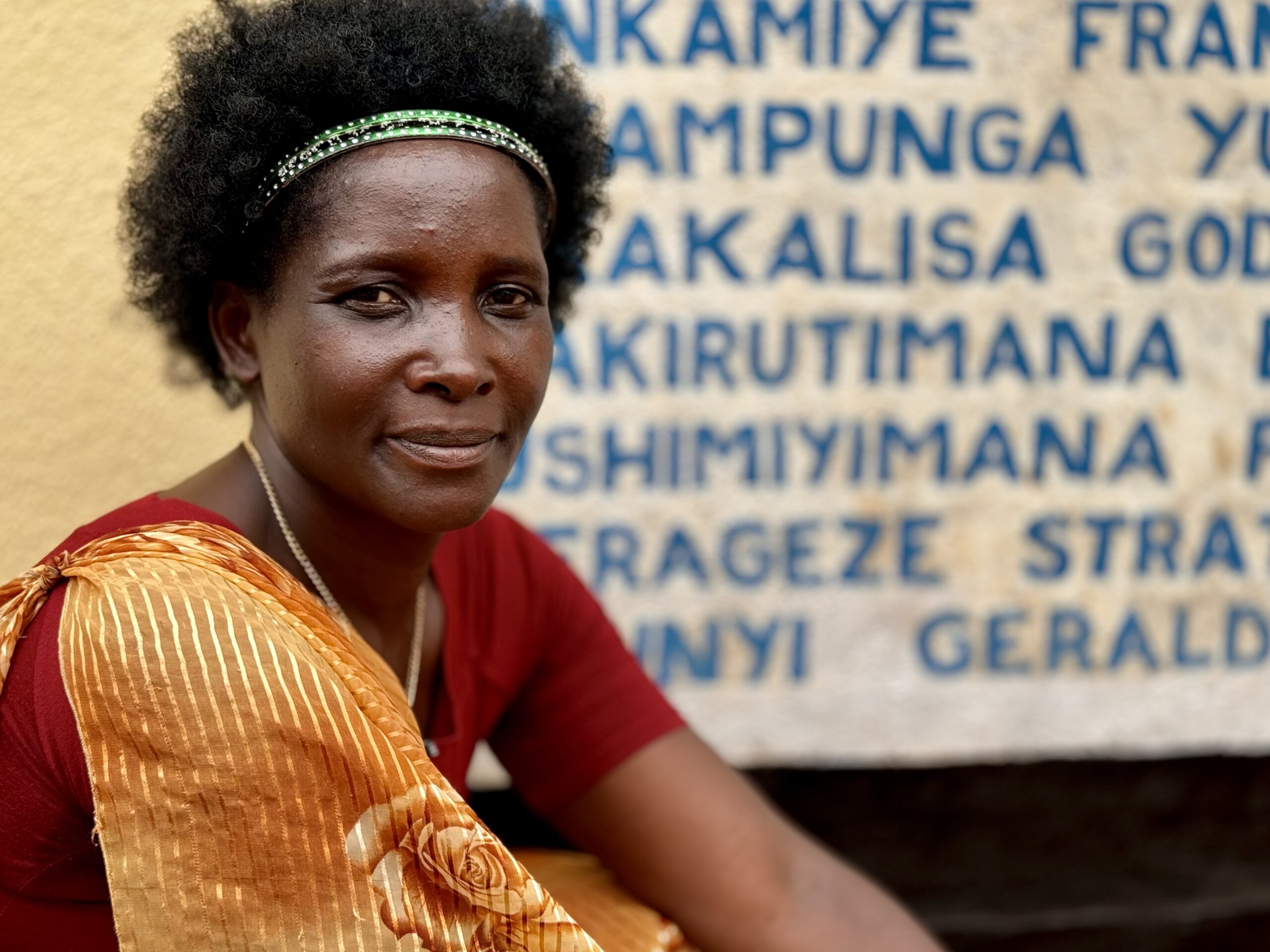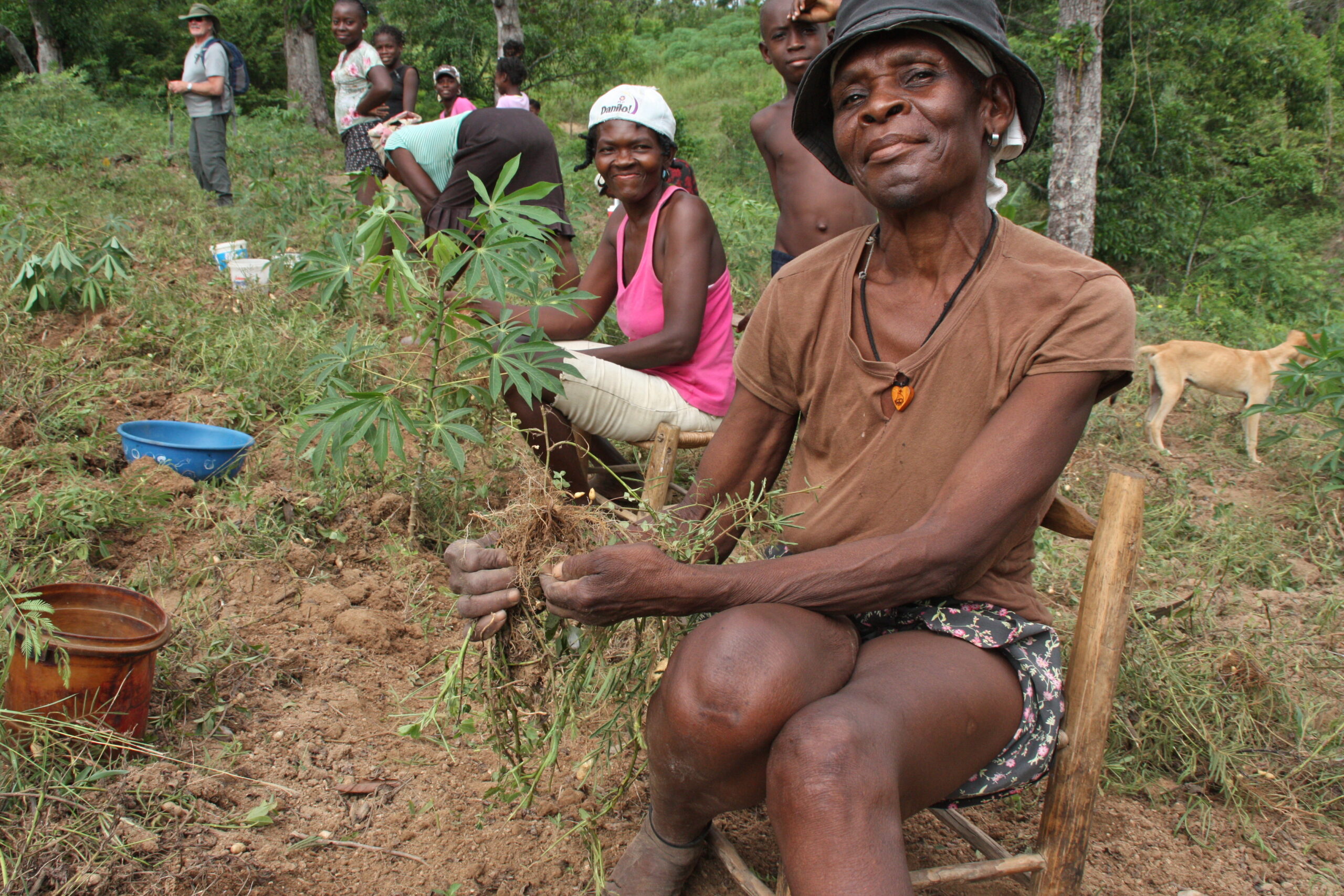With hunger rising in Haiti, 300 grassroots leaders from the People’s Organization for the Development of Northeast Haiti (OPODNE) gathered in August 2022 to launch a campaign to…
Learning exchange delegation to Rwanda
The Role of Grassroots Organizing in Overcoming Development Challenges in Africa and Beyond
January 22-26, 2024
Twenty-four people from the U.S., Ghana, Tanzania, and Namibia traveled to Rwanda to learn from Faith in Action’s Rwandan affiliate, People Improving Communities through Organizing (PICO Rwanda). Participants met with grassroots leaders, community organizers, government officials, and religious leaders, attended community meetings, visited local and national genocide memorials, and participated in a regular monthly community work day (Umuganda).
Five key themes emerged during the week:
-
History can be a powerful resource for social cohesion and development.
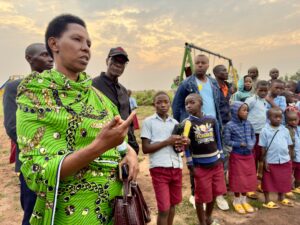
Genocide memorials are ubiquitous in Rwanda. Historical memory is a constant theme in how Rwandans talk about their motivation and focus on social cohesion and development. We screwed up, and now we have to work together without division and conflict to rebuild our country was a constant theme. On our first day, we visited the Nyarubuye Genocide Memorial at a Catholic Church where more than 20,000 people were murdered on April 15, 1994. After the visit, Charlotte Muteteli, a PICO Rwanda leader who survived the massacre in the church as a child, showed us the health center and school her local organizing team had brought to her community over the past four years. On the side of the clinic is a plaque with the names of the thirteen residents who did hundreds of one-to-one meetings with their neighbors, identified the need for a clinic and a school as priorities, negotiated with local officials to allocate funding for materials and annual operating costs, and did much of the labor to construct the buildings.
Lesson: Each country’s unique history is a powerful resource for motivating and channeling people’s energy toward organizing and development. When people take the time to talk through and process the history of their communities and countries, they can unify people around a common historical project. History can not only be a source of critique but also a road map for uniting people around a shared vision of the future.
-
Disciplined organizing and leadership development lead to personal and community transformation.
On the second day of the delegation, we visited Mumeya, a rural community in Eastern Rwanda, where Pastor John Rutsindintwarane began experimenting with organizing in Rwanda. We met people who have transformed their lives and communities over the past fifteen years. When Pastor John first came to the community, people asked what resources he was bringing. He said none, just ideas they could use to organize their resources to create change. After participating in trainings, a team of residents held more than 2,000 one-to-one meetings with their neighbors. They asked four basic questions: How long have you lived here? What development have you seen? What change would you like to see? What role could you play?
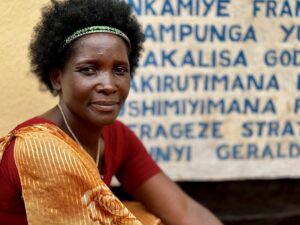
People identified the need for a health clinic as their top priority and shared stories of women dying in childbirth and people crossing the border into Burundi to obtain health care. Ezra Nkubana, one of the earliest grassroots leaders from Mumeya, described how he and his neighbors negotiated with their mayor and the national Minister of Health to obtain the resources to build what is now a 38-room health center, employing 18 full-time staff.
Through community organizing, Mumeya residents also brought clean water, electricity, roads, new schools, and forty thousand new trees to their communities. The health center has become a hub for economic activity and development. PICO Rwanda leaders say they need to organize more to create better opportunities for their children. Still, they are confident that their efforts will continue to be successful and be met with a positive response from government officials.
The community organizing process enabled residents in Mumeya to combine their knowledge and resources to imagine and create a different future for their community than officials had planned. With support from Pastor John, grassroots leaders created a democratic space that systematically valued local wisdom and paved the way for long-term sustainable development.
PICO Rwanda leaders emphasized the importance of their personal transformation. Specioza Dusengiman, a long-time grassroots leader from Mumeya, explained how she had learned to look public officials in the eye and not be afraid to ask for what her community needed. We saw this confidence in action when the Mumeya and Nyararube leaders asked their regional mayor to help them bring organizing to more communities in his district and our meetings with Catholic leaders. The most active grassroots leaders have trained many local officials on how to engage community residents in development and have traveled to other parts of Rwanda to teach community organizing.
Lesson: Long-term social change requires deep and sustained investment in regular people so they can develop the confidence, skills, and relationships to lead. People have in them everything they need to lead a transformation process in their communities and countries. Organizing provides the opportunity to practice leadership, gather local wisdom, and build accountable relationships with others working for social change. Bottom-up change begins with people in local communities solving concrete problems, learning from success and failure, and sharing what they are learning. This approach to change can start small and go slow at the start, but its results are long-lasting.
-
Organizing available internal resources is a source of power and accountability.
More than any other organization within the Faith in Action International network, PICO Rwanda has a history of mobilizing existing community resources before approaching government institutions for public investment. Residents clear land, break rocks, build the walls of schools and clinics, and plant trees. Rwandan organizers and grassroots leaders repeatedly emphasized the need for community residents to hold themselves accountable before holding the government accountable to do as much as possible to solve their own problems before asking for help.
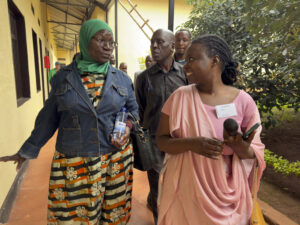
Some people visiting Rwanda, particularly from the U.S., expressed a concern that this approach lets public officials off the hook. Yet the Rwandan organizers and grassroots leaders we spoke to were clear that their mission is to create accountability between communities and government institutions. They shared stories of persuading public officials to invest public resources in priorities identified by the community. Residents may volunteer to build buildings, but they negotiate with government officials for the materials. And the government provides the staff and funds to operate the clinics and schools.
The reliance on self-help is a product of how poor Rwanda is as a country. It also reflects trust in the government. In a world where people have lost confidence in institutions, Rwandans expressed remarkable trust in their government to work with them to transform Rwandan society. PICO Rwanda leaders told us that doing many one-to-one meetings and organizing their labor and resources makes it harder for government officials to say no. Their labor is a form of power they can bring to the table to negotiate change.
When the Mumeya leaders traveled to Kigali more than a decade ago to meet with the national Health Minister, they brought power and credibility from already securing and clearing the land for their clinic. When the Minister agreed to provide the remaining funds needed to construct the clinic, it may have been the first time in post-genocide Rwanda that the central government made a significant resource allocation decision in response to organized community pressure.
Lessons: Communal vs government accountability may be a false choice if looked at through the lens of different forms of power-building. People need direct experience working with their neighbors and public officials to solve concrete problems and imagine and create a different future. Mobilizing existing communal resources does not require the government to step back. Instead, it can be a source of power to negotiate accountability from officials.
-
Growth
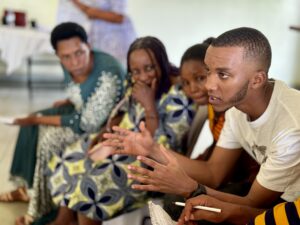
Religious and community leaders across Rwanda and Africa are building on work begun in Mumeya to spread community organizing to new communities and countries. People from Ghana, Tanzania, and Namibia participated in the delegation to learn more about organizing practices and methods they are already beginning to use in their countries. They see that the one-on-one approach and organizing process enables people to create a shared future and is a powerful counter-balance to more common top-down, project-based development practices. People are hungry to know more about organizing. They want to recover organizing practices in their own traditions and communities. On the fourth day of the delegation, we focused on the practices and relationships that help grow organizing. We met with Catholic Cardinal Antoine Kambanda, Archbishop of Kigali, and Bishop Anaclet Mwumvaneza of the Nyundo Diocese in Western Rwanda to discuss how the Catholic Church can help bring grassroots organizing to communities across Rwanda. We discussed how organizing can help communities become more resilient to climate change and supplement charity and relief.
Lessons: To build enough power to influence larger policy decisions and systems, organizations must grow into new communities and regions, thus expanding their power. Growth also facilitates learning. Growth requires planning, systems, and investment in relationships. Faith leaders can play a critical role in institutionalizing and spreading organizing practices. While faith communities and institutions may value leadership development and addressing the root causes of poverty, they often default to charity. To grow organizing, we need to understand the interests that religious and community leaders have in building power and distributing leadership. Grassroots leaders who have organized successfully in their communities are an invaluable resource for explaining and motivating people to engage systematically in bottom-up change. The PICO Rwanda leaders are willing to travel to other communities and countries to share their knowledge. Their challenge to the delegation was that if you have problems in your country if people are mistreated or abused, do more one-to-ones and build more power.
-
Taking agency over development
Rwanda has led the world in asserting agency over development resources and decisions rather than allowing international funding agencies, contractors, and NGOs to determine projects and strategies. The country has also made gender equity, including investment in equitable educational opportunities for girls and women, a key focus of its development approach. The Rwandan government has committed to shifting decision-making over development to local communities. However, the country has a long history of centralized political power. PICO Rwanda is playing an important role in demonstrating that grassroots leaders can work together peacefully to drive change and hold officials accountable. The leadership and agency of rural residents are critical to equitable and sustainable development in Rwanda and a democratic future for the country.
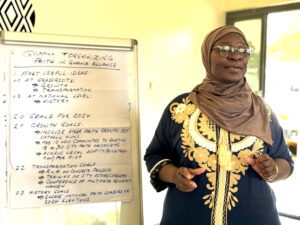
Lessons: The singular focus of Rwandan officials and society on development and trust that Rwandans have in government is hard to replicate. Indeed, centralizing political power in a single ruler or party is more likely to lead to corruption and self-dealing than investment in health and education. The Rwandan story shows that a state can make development its focus and negotiate from strength with aid agencies and NGOs. However, to make national self-determination over development sustainable and effective in the long run requires a culture of development that follows the lead of residents.
Conclusion:
At the end of the delegation, participants from Rwanda, Ghana, Tanzania, Namibia, and the U.S. set goals for 2024. These goals included slowing down to invest more deeply in leadership development, step-by-step bottom-up organizing in the most oppressed and marginalized communities, and starting organizing efforts in new communities. To support these goals, the International Learning Exchange will focus on organizing fundamentals in 2024, with monthly Basics & Beyond Zoom calls and other resources to strengthen organizing practices. We look forward to our next International Delegation to Central America in August 2024.

